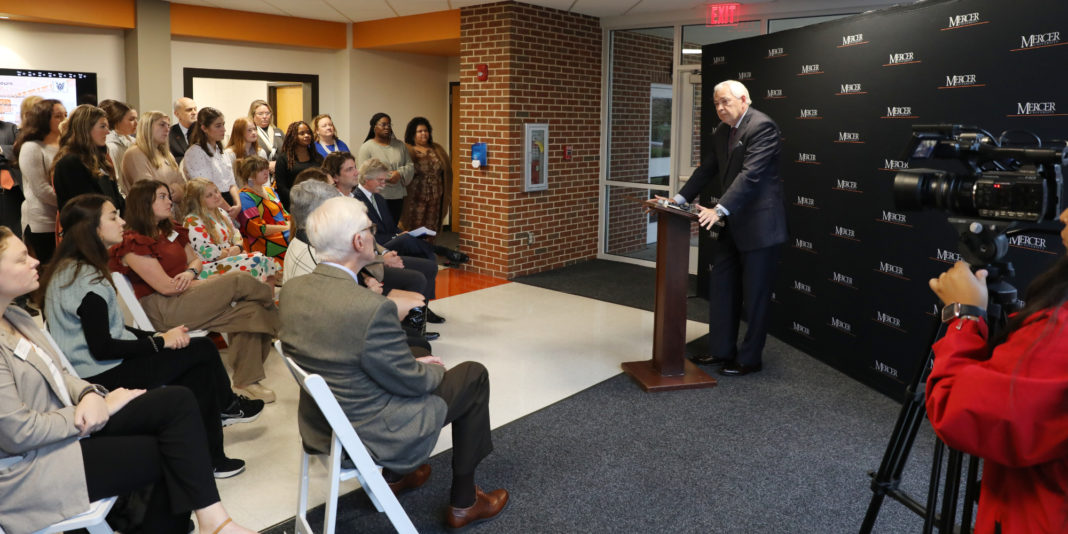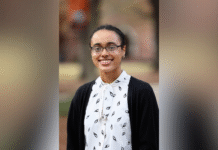MACON – Mercer on Thursday announced the establishment of a transitional school for children with dyslexia to be built on the University’s Macon campus.
Roberts Academy at Mercer University will be constructed, equipped and endowed through a major gift commitment by Hal and Marjorie Roberts of Lakeland, Florida.
The Academy, which will be affiliated with Mercer’s College of Education, will be the only school of its kind in Georgia outside of Atlanta.
“Every year, millions of children in this country are diagnosed with dyslexia, the most common cause of reading, writing and spelling challenges. With early screening, early diagnosis, early evidence-based reading intervention and appropriate accommodations, dyslexic individuals can become highly successful,” said Mercer President William D. Underwood. “People like Albert Einstein, Thomas Edison, Leonardo da Vinci, Walt Disney, Steve Jobs and Pablo Picasso were dyslexic. Several American presidents were also dyslexic.”
Expected to break ground in late spring of 2023 and open by the fall of 2024, Roberts Academy will initially serve as many as 80 students in grades two through five, with potential to expand enrollment and grade levels served.
The proposed site of the Academy is off Linden Avenue, near the Mercer Outdoor Recreation Complex and two blocks from Tattnall Square Park.
“It is very important to the Roberts family and to the University that Roberts Academy be affordable for families with dyslexic children,” Underwood said. “Thanks to the extraordinary generosity of Hal and Marjorie Roberts, we will be able to achieve that objective.”
Modeled after the successful Roberts Academy at Florida Southern College in Lakeland, the mission of Roberts Academy at Mercer University is to prepare students with dyslexia to achieve academic success through dynamic educational programs.
“We are elated that Mercer University understands our dream of sharing the appropriate method of teaching children in Middle Georgia who have dyslexia. Having experienced our grandchildren’s early struggles and their later achievements, and those of hundreds of children at the Academy in Lakeland, we feel compelled to help others accomplish the same success,” said Hal Roberts. “We have experienced parents in tears of frustration and been with them two weeks later as they were thrilled over their child’s immediate acceptance by children with the same challenges and their early progress in school.”
Roberts Academy will teach a comprehensive curriculum using the Orton-Gillingham approach, a specialized learning method clinically proven to help students with dyslexia. Applied in the Academy’s classroom, the Orton-Gillingham approach will engage students in action-oriented learning that combines auditory, visual and physical movement elements to teach basic concepts of reading, writing and spelling across the curriculum.
Students can attend Roberts Academy until they have mastered the skills to accommodate their learning differences and are prepared to succeed in a traditional school setting.
“Roberts Academy’s curriculum will follow the Georgia Standards for Excellence. Students will learn and demonstrate competencies in mathematics, science, social studies, art, music and physical education, along with reading, writing and spelling,” said Dr. Thomas Koballa, dean of the College of Education. “As a transitional school, we aim to prepare students with the understanding, skills and confidence to succeed in a traditional public or independent school. I also envision Roberts Academy as a hub for teacher professional development about dyslexia.”
For more information or inquiries by families of prospective students, prospective employees or others, visit robertsacademy.org.
About the College of Education
Mercer University’s Tift College of Education – with campuses in Macon, Atlanta and the University’s two regional academic centers – prepares more professional educators than any other private institution in Georgia. Named for the former women’s college that merged with Mercer in 1986, the College of Education offers baccalaureate and graduate degrees, and is guided by the conceptual framework of the “Transforming Educator,” which supports those who aspire to grow professionally throughout their careers, while also seeking to transform the lives of students. For more information, visit education.mercer.edu.
Featured photo by Christopher Ian Smith










